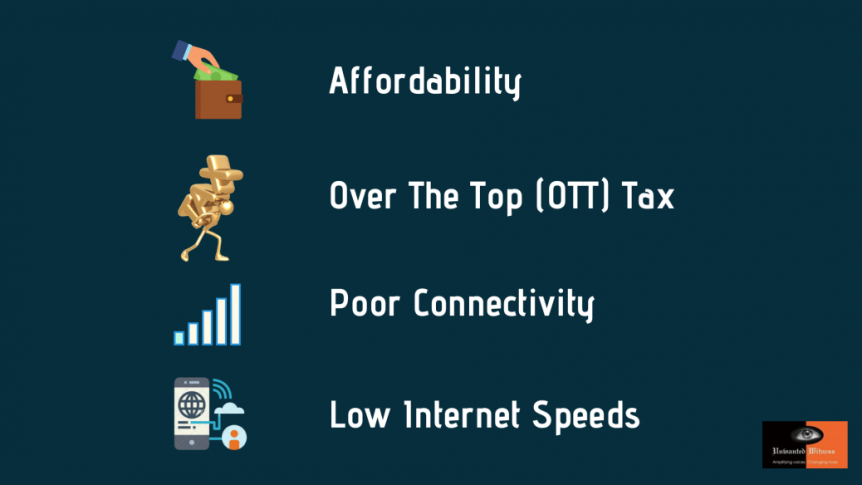
This article was republished from Unwanted Witness, an APC member organisation.
With the COVID-19 pandemic, we are facing an unprecedented situation on a global level. People everywhere are asked to cease physical interactions (social distancing); in an instant COVID-19 has forced a move to the remote model and a social barrier has been broken.
Human rights defenders (HRDs) in Uganda are not exceptional, amidst the health crisis and subsequent containment measures, the internet has become the lifeline to the work of HRDs currently working from home.
Many have swiftly embraced digital tools to conduct meetings, advocacy, and campaigns among others. The concept of social distancing is forcibly driving significant change in the operation of HRDs. However, this global shift assumes that all HRDs and people alike have access to the internet and the cost of data is significantly low. It is even worse in Uganda, a country with a meager 37.9% internet penetration, the connected few also face numerous challenges ranging from affordability, low internet bandwidth, yet internet is a fundamental human right.
For Elizabeth Bagadala, a Women Human Rights Defender in rural South-Western Uganda, the high cost of mobile data has stalled operations of her human rights work.
“Before the lockdown, we relied on office Wi-Fi to empower teenage mothers with fashion and designing skills shared via Facebook and WhatsApp, but this is no longer possible due to unaffordable mobile data,” narrates Bagadala, a team leader at Ideal Women.
Bagadala is even more disturbed about the resultant effects of the lockdown to the safety of thousands of teenagers, who are currently vulnerable to sexual abuse within their villages.
In Kasese district, a press freedom advocate Simon Bikeke struggles with cost and connectivity. “I am forced to leave the confines of my home in search of fair internet connection, these movements landed me in trouble with security officers, enforcing lockdown who beat me,” says Bikeke.
The pandemic reinforces the need for universal internet access as a human right, in a country where majority of the population are excluded.
In July 2018 Uganda instituted a tax on over the top messaging platforms, mandating users to pay a fee of UGX 200 ($0.5) daily in order to use these services; further widening the digital divide. Users continue to circumvent using Virtual Private Network (VPN) amidst threats of blockage from the telecom regulator, UCC.
The tax significantly slashed the number of internet users in Uganda by 5 million in the first three months alone according to figures from the industry regulators the Uganda Communication Commission (UCC). Only half of the country’s internet subscribers were paying the Over-The-Top (OTT) service tax by the third month after its introduction; because of this tax, the internet penetration in Uganda which stood at 47% fell to a dismal 37.9% compared to Kenya’s 91% and Tanzania’s 43%. This greatly exacerbated internet affordability as well as threatening access to the internet which is not only a fundamental enabler of human rights but a right of its own.
In times of social distancing HRDs and other sectors without either access, reliable or affordable internet connection may have their operations and activities disrupted tremendously.
According to the 2017/18 Uganda national information technology survey, it was observed that social media platforms such as Facebook and WhatsApp are some of the popular avenues for citizens to engage with each other and pursue business opportunities.
A recent study by the telecom regulator Uganda Communication Commission put the cost of acquiring 1 Gigabyte (GB) of internet at $2.67 (UGX 10,041) compared to Kenya’s $2.41 (UGX 8,925). The price of subscription is a key limitation to internet use followed by the low internet speeds and lack of connectivity in some areas. By acting as a catalyst for individual’s freedom of opinion and expression, the internet has become a key means by which individuals can exercise this fundamental right as stated in article 29 of the 1995 Uganda constitution, article 19 of The Universal Declaration of Human rights and the international covenant on civil and political rights.
The government consequently needs to reassess its position on the taxation to ensure a more inclusive financial economy and digital society that does not discriminate or disenfranchise already the marginalized and vulnerable communities including persons with disabilities (PWDs), women, youth and rural communities. It should also consider implementing the National Broadband Policy that was passed in 2018 which will reduce data prices, cure the impediments by putting in place an appropriate framework to address the infrastructure development gaps, legal and regulatory environment and capacity gaps of the citizens to productively exploit ICT.
Without minimizing the devastating impact of COVID-19 on Human Rights Defender’s (HRDs) operations and activities, it’s important not to lose sight of the digital opportunities that are emerging now. While these are often short term responses to the pandemic they have the potential to become long-standing shifts in the operations of HRDs and HROs once the current crisis has passed.